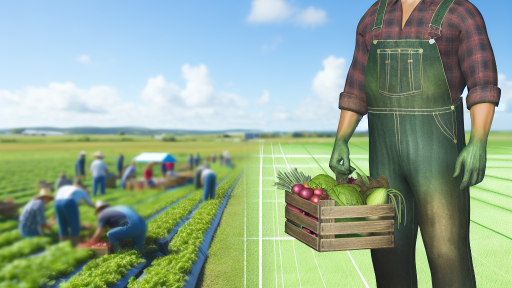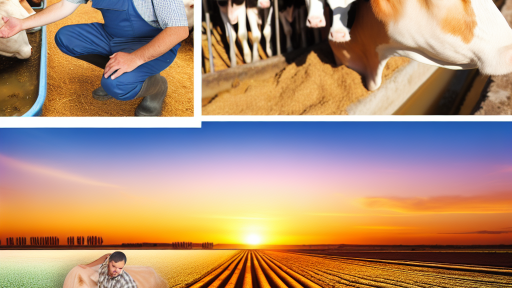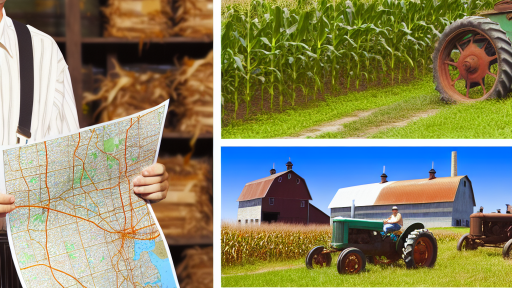Introduction to Agri-Tourism
Agri-tourism connects farmers with consumers directly.
This vibrant industry enhances the relationship between agriculture and tourism.
It allows visitors to experience farm life and promotes local produce.
This connection fosters a better understanding of food sources.
Definition of Agri-Tourism
Agri-tourism encompasses various activities at farms.
These activities include tours, workshops, and farm stays.
Farmers host visitors to showcase their operations and products.
Moreover, the experience offers educational insights about agriculture.
Importance of Agri-Tourism
Agri-tourism plays a crucial role in economic development.
It generates additional income for farmers, which is essential.
Additionally, it helps preserve agricultural landscapes and ecosystems.
This industry fosters community engagement and local pride.
Moreover, it contributes to sustainable tourism practices.
Visitors learn about local food systems and support farmers directly.
Historical Context: The Evolution of Agri-Tourism
Early Beginnings of Agri-Tourism
Agri-tourism has roots that trace back to early farming communities.
Transform Your Agribusiness
Unlock your farm's potential with expert advice tailored to your needs. Get actionable steps that drive real results.
Get StartedPeople visited farms to experience agricultural life firsthand.
This practice fostered connections between rural and urban populations.
Rise in Popularity
The 20th century marked a significant increase in agri-tourism.
Families began seeking vacations that offered farm experiences.
For instance, they enjoyed fruit-picking and hayrides.
Travelers wanted authentic experiences away from urban settings.
Modern Developments
In recent decades, agri-tourism has expanded further.
Technology has played a crucial role in this growth.
Farmers now use social media to attract visitors and share updates.
This accessibility helps connect consumers directly with producers.
Benefits to Farmers and Consumers
Agri-tourism benefits both farmers and consumers significantly.
Farmers enjoy an additional income stream from visitors.
Visitors, in turn, gain insights into farming practices.
They also experience the joys of rural life and fresh produce.
Challenges Faced
Despite its benefits, agri-tourism presents challenges.
Farmers must balance their agricultural duties with hosting visitors.
Additionally, regulations can complicate operations.
Weather can impact both crops and visitor numbers.
The Future of Agri-Tourism
Looking ahead, agri-tourism will likely continue to evolve.
As environmental concerns grow, sustainable practices will gain prominence.
This shift could attract eco-conscious travelers seeking these experiences.
Ultimately, agri-tourism will strengthen connections between food producers and consumers.
Benefits of Agri-Tourism for Farmers
Economic Impacts
Agri-tourism creates new revenue streams for farmers.
This form of tourism diversifies income sources beyond traditional farming.
Showcase Your Farming Business
Publish your professional farming services profile on our blog for a one-time fee of $200 and reach a dedicated audience of farmers and agribusiness owners.
Publish Your ProfileAdditionally, it reduces financial risks associated with crop failures.
Pursuing agri-tourism can boost local economies remarkably.
Farmers can sell more products directly to consumers.
Moreover, it enables them to showcase unique local goods.
Packing farms with tourists encourages spending in the community.
Consequently, businesses like restaurants and shops benefit as well.
Social Impacts
Agri-tourism fosters connections between farmers and consumers.
This relationship builds trust and enhances community engagement.
People gain insight into farming practices and challenges.
Farmers can share their stories and educate visitors effectively.
Moreover, interpersonal interactions enhance customer loyalty.
Agri-tourism also promotes appreciation for local agriculture.
Events like harvest festivals draw community participation and pride.
Such activities strengthen social bonds across generations.
Environmental Awareness
Visitors often leave with a greater understanding of sustainability.
Farmers can demonstrate eco-friendly practices to their guests.
In turn, this awareness encourages more sustainable consumer behaviors.
Agri-tourism provides an excellent platform for environmental education.
Moreover, it underscores the importance of preserving farmland.
Farmers can lead discussions on issues like biodiversity conservation.
It also promotes local heritage and traditional farming methods.
Consequently, agri-tourism can play a role in environmental advocacy.
Explore Further: Maximizing Yields with Organic Small-Scale Methods
Consumer Perspectives: Why People Choose Agri-Tourism Experiences
Desire for Authenticity
Many consumers seek authentic experiences in today’s fast-paced world.
Agri-tourism offers a genuine connection to food and farming.
Visitors enjoy learning about the origins of their food.
They appreciate hands-on experiences that traditional supermarkets can’t provide.
Support for Local Farmers
People increasingly want to support local agriculture.
Agri-tourism directly benefits farmers by providing additional income streams.
Consumers feel good knowing their money goes to local producers.
This support fosters a sense of community and sustainability.
Educational Opportunities
Agri-tourism provides educational experiences for all ages.
Families often take trips to teach children about farming and food sources.
Workshops and demonstrations enhance understanding of agricultural practices.
Highlights of local traditions and practices add a unique touch.
Connection with Nature
Many consumers yearn for a stronger connection to nature.
Agri-tourism allows visitors to immerse themselves in beautiful landscapes.
Activities like fruit picking or farm tours foster appreciation for nature.
Breathtaking views enhance the overall experience and relaxation.
Health and Wellness Focus
Health-conscious individuals often seek fresh, organic produce.
Showcase Your Farming Business
Publish your professional farming services profile on our blog for a one-time fee of $200 and reach a dedicated audience of farmers and agribusiness owners.
Publish Your ProfileAgri-tourism promotes healthy eating by providing direct access to fresh food.
Farm visits encourage buying seasonal and locally sourced products.
This focus on wellness aligns with the growing trend of mindful eating.
Unique Experiences
Agri-tourism offers one-of-a-kind experiences that stand out.
Visitors enjoy activities such as cooking classes, wine tastings, or craft workshops.
These unique experiences attract tourists looking for something different.
Memorable interactions create lasting impressions that keep people coming back.
See Related Content: Sustainable Irrigation Techniques For Modern Farms
Types of Agri-Tourism Activities
Farm Stays
Farm stays offer visitors a unique experience to live on a working farm.
Guests enjoy immersive agricultural activities during their stay.
They can participate in daily chores and learn about farm life.
This interaction fosters a stronger connection between consumers and farmers.
Farm operators often provide accommodations, meals, and guided tours.
Families and individuals appreciate the opportunity to bond with nature.
U-Pick Activities
U-Pick activities invite consumers to harvest their own produce.
Farms typically offer various fruits and vegetables, depending on the season.
Visitors enjoy the hands-on experience of picking fresh produce.
This activity promotes healthy eating and food awareness.
Consumers often share their experiences on social media, enhancing visibility.
U-Pick farms create a fun and educational environment for all ages.
Farm Tours
Farm tours provide an educational overview of agricultural practices.
Visitors learn about crop production, livestock management, and sustainability.
Guided tours often involve demonstrations and tastings.
Tourists gain insight into the hard work that goes into food production.
Many farms introduce innovative techniques and technologies during tours.
Events and Festivals
Special events and festivals attract large crowds to farms.
These gatherings often celebrate seasonal harvests or local traditions.
Activities include hayrides, corn mazes, and live music.
Food vendors often showcase local produce and specialties at these events.
Events foster community engagement and support local economies.
They also give consumers an opportunity to connect with farmers directly.
Uncover the Details: Connecting Farms with Schools: A Farmer’s Guide
Marketing Strategies: How Farmers Can Promote Their Agri-Tourism Ventures
Understanding Your Audience
Identifying target customers is essential for successful marketing.
Understand their preferences regarding agri-tourism experiences.
Research local demographics to tailor your offerings.
Engage with potential visitors through surveys to gather insights.
Utilize social media to connect with the audience on various platforms.
Utilizing Digital Marketing
Develop a user-friendly website to showcase your agri-tourism venture.
Ensure it includes essential information like prices and schedules.
Additionally, maintain active social media profiles to share updates.
Showcase Your Farming Business
Publish your professional farming services profile on our blog for a one-time fee of $200 and reach a dedicated audience of farmers and agribusiness owners.
Publish Your ProfileUse high-quality images and videos to attract viewers’ attention.
Consider blog posts that share stories about farm life and experiences.
Collaborating with Local Businesses
Form partnerships with nearby hotels and restaurants.
Cross-promote each other’s services to increase visibility.
For example, provide discounts to guests of partner businesses.
Organize joint events that showcase both your offerings.
This strategy creates a win-win situation for everyone involved.
Offering Unique Experiences
Create memorable experiences that differentiate your farm.
Host workshops where visitors can learn about farming techniques.
Incorporate seasonal activities like pumpkin picking or hayrides.
Also, consider providing farm-to-table dinners for guests.
This approach encourages visitors to return and spread the word.
Leveraging Word of Mouth and Reviews
Encourage satisfied customers to leave positive reviews online.
Offer incentives, such as discounts on future visits, for reviews.
Highlight testimonials on your website and social media profiles.
Personal referrals are powerful tools for attracting new visitors.
Engage with customers and show appreciation for their support.
Gain More Insights: Local Food Sourcing Tools and Resources for Farmers

Challenges in Agri-Tourism
Regulatory Challenges
Agri-tourism faces numerous regulatory challenges.
Farmers must navigate complex local and state laws.
These laws often vary significantly from one region to another.
Compliance with health and safety regulations is essential.
Additionally, zoning laws can restrict farm activities.
Farmers may need special permits for hosting visitors.
These processes can be time-consuming and costly.
Seasonal Challenges
Seasonality poses another significant challenge in agri-tourism.
Various crops and activities peak at different times of the year.
Weather conditions greatly affect agricultural productivity.
Unpredictable weather can hinder planned tours or activities.
Farmers must adapt their offerings to match seasonal changes.
For instance, pumpkin patches are popular in autumn.
Conversely, berry picking thrives in summer.
Market Considerations
Understanding market demand is vital for agri-tourism success.
Targeting the right audience can maximize profitability.
Competition from other entertainment sectors is fierce.
Farmers must create unique experiences to attract visitors.
Marketing strategies must focus on local attractions.
Additionally, pricing needs to reflect the presented value.
Farmers should also consider partnerships with local businesses.
Case Studies: Successful Agri-Tourism Farms and Their Practices
Sunny Acres Farm
Sunny Acres Farm stands out as a leading agri-tourism destination in Iowa.
Showcase Your Farming Business
Publish your professional farming services profile on our blog for a one-time fee of $200 and reach a dedicated audience of farmers and agribusiness owners.
Publish Your ProfileThis farm combines traditional farming with innovative tourist experiences.
Visitors can enjoy activities like apple picking and hayrides.
Moreover, the farm features a petting zoo where children interact with animals.
Sunny Acres also hosts seasonal festivals, enhancing visitor engagement.
Community involvement is key, as local artisans sell handmade goods onsite.
Green Valley Vineyards
Green Valley Vineyards offers a unique wine-tasting experience in California.
This vineyard allows guests to explore the winemaking process firsthand.
Guided tours showcase the vineyard’s organic farming practices.
Additionally, guests can attend educational workshops on wine pairing.
The vineyard’s picturesque setting enhances the overall experience.
Live music events further attract tourists seeking a relaxing afternoon.
Harvest Moon Honey Farm
At Harvest Moon Honey Farm, visitors discover the world of beekeeping.
This farm emphasizes sustainable practices and pollinator education.
Workshops on honey extraction are popular among guests.
Visitors can sample various honey flavors, enhancing their appreciation of local products.
The farm also sells honey-based products, creating an additional revenue stream.
Thus, Harvest Moon connects consumers with the importance of pollinators.
Prairie Garden Farms
Prairie Garden Farms focuses on organic vegetables and community-supported agriculture.
The farm invites members to participate in planting and harvesting activities.
This hands-on approach builds a strong bond between farmers and consumers.
Moreover, Prairie Garden offers cooking classes to teach preparation techniques.
Such classes elevate awareness of healthy eating and food origins.
The farm’s monthly open houses attract families looking for wholesome activities.
Mountain Ridge Alpaca Ranch
Mountain Ridge Alpaca Ranch specializes in alpaca breeding and fiber production.
This ranch offers guided tours showcasing alpaca care and shearing processes.
Visitors can also enjoy interactive experiences like feeding the alpacas.
The farm hosts annual wool festivals, fostering a sense of community.
Additionally, products made from alpaca fiber are available for purchase.
This unique aspect enriches the agri-tourism experience at the ranch.
Future Trends in Agri-Tourism: Sustainability and Community Engagement
Emphasizing Sustainability Practices
Agri-tourism is increasingly adopting sustainable practices.
Farmers are now using organic farming methods.
This shift attracts environmentally conscious consumers.
Additionally, many farms are focusing on conservation efforts.
They aim to protect local ecosystems and wildlife habitats.
Innovative Community Involvement
Community engagement plays a vital role in agri-tourism.
Local residents are encouraged to participate in farm activities.
This builds stronger relationships between farmers and consumers.
Many farms offer workshops and educational programs.
Visitors can learn about sustainable farming techniques.
Utilizing Technology for Better Experiences
Technology significantly enhances the agri-tourism experience.
Showcase Your Farming Business
Publish your professional farming services profile on our blog for a one-time fee of $200 and reach a dedicated audience of farmers and agribusiness owners.
Publish Your ProfileFarmers utilize apps to connect with visitors.
These platforms provide information on events and tours.
Moreover, virtual tours have become more popular.
They allow potential visitors to explore farms remotely.
Encouraging Local Products and Markets
Agri-tourism promotes local products and artisans.
Markets showcasing regional foods are increasingly common.
Visitors enjoy tasting local specialties during their visits.
Additionally, this supports the local economy.
Community-driven markets foster a sense of pride and collaboration.
Building Resilience through Agri-Tourism
Agri-tourism helps farmers diversify their income streams.
This diversification creates resilience against market fluctuations.
Farmers can rely on both agricultural and tourism revenue.
Such adaptability is crucial for long-term sustainability.
Ultimately, it enhances the overall viability of rural areas.
Additional Resources
The Role of Local and Regional Food Systems in U.S. Farm Policy




